Highlights from CIED/ACE roundtable event by Nora Blascsok Making our homes as comfortable and aesthetically pleasing as possible is an aspiration of many. However, not enough people realise that measures to make their homes more energy efficient can also deliver these outcomes. How do we make sure people know about this and care? What is …
Emergence
Innovation is an uncertain process in which emerging technologies struggle against existing socio-technical systems. To succeed, new innovations need to be ‘sheltered’ from prevailing selection pressures to provide space for development and learning. This theme studies a limited number of emerging and promising low energy innovations with the aim of better understanding the mechanisms and processes involved and the conditions for success.

Warm Homes for All: how do we speed up the uptake of retrofits?
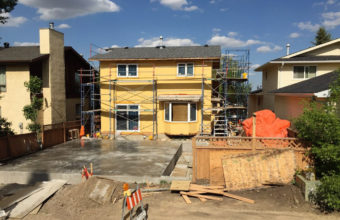
Carbon targets at risk without improved provision of residential retrofits, says new report
According to a new report published by CIED, more ambitious mix of policies are needed to deliver the required energy savings in UK homes by 2035.

CIED researcher invited to join Mayor of London Fuel Poverty Partnership
Dr Mari Martiskainen has been invited to join the Mayor of London Fuel Poverty Partnership.
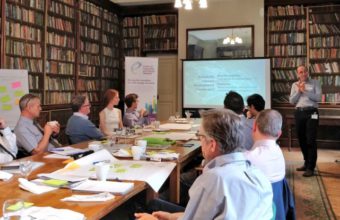
Automation in the freight industry: expectations and experimentation
CIED and the Transport Studies Unit at Oxford University hosted a stakeholder workshop on ‘Urban Freight Futures: Innovation and Experimentation’.

Intermediation and policy development in UK low energy housing
A new article by CIED researchers explores the interaction between the UK’s low energy housing policy and intermediation.

Improving the UK’s housing stock needs more than energy efficiency champions, says new report
If low-energy buildings are to become more widespread, new policy drivers will be crucial say researchers based at CIED at the University of Sussex.

The role of energy internet forums in the low carbon transition
A new paper co-authored by Dr Mari Martiskainen looks at the role of energy internet forums in the low carbon transition.
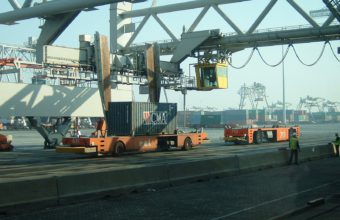
Governance of transition to autonomous vehicles in the UK lacks inclusivity and openness
A new article, written by Dr Debbie Hopkins and Dr Tim Schwanen, argues that the way the transition to AVs is governed in the UK lacks inclusivity

Fuel Poverty Awareness Day
According to a new report by National Energy Action (NEA) , a national charity seeking to end fuel poverty, the UK has the sixth worst long-term rate of excess winter mortality out of 30 European countries, with an average of 9,700 deaths per year attributed to cold homes. Fuel poverty can affect the most vulnerable …
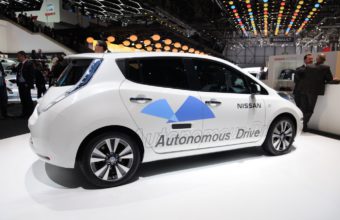
On the cusp of a driverless transition?
Blog by Dr Debbie Hopkins (Centre on Innovation and Energy Demand, Transport Studies Unit, University of Oxford). Nissan Autonomous Drive Vehicle. Image by Norbert Aepli. Shared under Creative Commons Attribution 3.0 Unported license. There is a great deal of excitement about the potential of driverless vehicles (also called self-driving, autonomous, connected and autonomous …
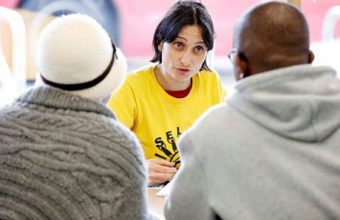
As the temperature drops… Energy advice for energy poverty alleviation
Blog by Louise Sunderland. As the weather turned really cold for the first time last month the UK government published its latest piece of research into fuel poverty (energy poverty) – a report on the behaviours and attitudes of the fuel poor. The research report contains some interesting if not wholly new insights into the …
Community action addressing fuel poverty
Dr Mari Martiskainen speaks on how community groups are addressing fuel poverty in the UK. All welcome!

Could community energy be part of Finland’s transition to a low carbon future?
In recent years there has been a surge of interest in community energy projects. Countries such as Denmark, Germany and the UK have seen such initiatives flourish, creating new ways of “doing energy”. As the country with the second highest share of renewables in Europe, one might expect to also find Finland among the leaders …

Energy cafes can play a key role in targeting fuel poverty, argues new report
Community-run energy advice centres or ‘energy cafés’, can play a key role in targeting fuel poverty, according to a new report published today.

Intermediaries and champions: the unsung heroes of low energy housing
By Mari Martiskainen and Paula Kivimaa Have you ever wanted to see what it’s like inside a low energy home? In Brighton you can, through Eco Open Houses, an event showcasing the latest ideas and practices in low energy, sustainable homes. The event is not only a boon for those who enjoy the opportunity to …

Humanizing Socio-technical Systems with Energy Justice
CIED and SPRU Research Fellow Kirsten Jenkins will be presenting her work on socio-technical systems and energy justice. All welcome!
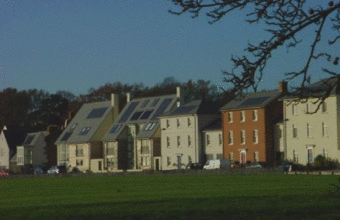
Driving innovation in low-energy buildings: key lessons from experience in the UK and Europe
Paula Kivimaa & Mari Martiskainen Buildings use around 40% of our total energy consumption and account for over 30% of Europe’s greenhouse gas emissions, but innovative building concepts – such as passive houses, zero-carbon buildings and whole house retrofits – are not yet widely used by the construction and renovation industry. How can we accelerate …
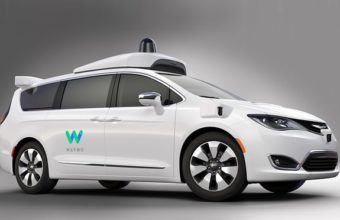
New Guardian article on Peak Cars by Dr Tim Schwanen
Dr Tim Schwanen, Co-Director at CIED and Associate Professor in Transport Studies at the University of Oxford, has written a comment piece for…

CIED researcher discusses fuel poverty at Brighton General Hospital
Dr Mari Martiskainen was invited to give a presentation on her fuel poverty research to a ‘Care without Carbon’ session at Brighton General Hospital.

CIED researcher appointed to Expert Advisory Group of Scottish Government-funded project
Dr Jan Rosenow has been appointed to the Expert Advisory Group for Scottish Government-commissioned project on energy efficiency policy effectiveness.
Is energy efficiency a worthwhile investment? – Interview with Marilyn Brown
Listen to Dr. Marilyn A. Brown from the School of Public Policy, Georgia Institute of Technology, co-author of Fact and Fiction in Global Energy Policy, and co-recipient of the 2007 Nobel Peace Prize for her research on mitigating climate change in this short interview. …
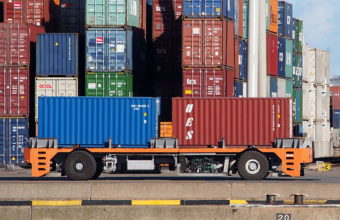
Constructing Legitimacy for Automated Goods Mobility
Dr Debbie Hopkins is coming to present research conducted by her and Dr Tim Schwanen on automated goods mobility. All welcome!

The energy implications of automated and smart freight mobility
What are the expected impacts of automated vehicles and smart mobility on energy demand in UK freight transport? How are these technological innovations legitimised by industry, policymakers and other actors? This project aims to find out.

The Fuel Bill Drop Shop Project
Energy shops provide advice about energy issues to the public. Does advice through energy shops work, with whom and under what circumstances?

Low Energy Housing Innovations and the role of Intermediaries (LEHII)
How have innovations in whole house retrofits and zero carbon new build houses developed in the UK? What role do intermediaries play in facilitating and governing transitions to low energy housing?

Grassroots innovation in low energy digital fabrication
Rapid advances in open-source, small-scale digital design and fabrication technologies are opening up new possibilities for decentralised, networked, user-led manufacturing. A confluence of new technologies (e.g. the 3-D printing ‘revolution’), new business models (e.g. ‘personalised manufacturing’), and new social movements (e.g. ‘open-source, commons-based, peer-production’), are prompting claims about the ‘reconfiguration’ of production and consumption. For …

Innovations in urban transport
Why do innovations in low-energy transport emerge and develop more rapidly in some cities than in others? What can local governments and stakeholders do to stimulate the success of such innovations?

Energy for Society: First International Conference on Energy Research & Social Science
Jim Watson, Harriet Thomson and Benjamin Sovacool (Image credit: Mari Martiskainen) What do folklore, yak cheese, Chinese dams and the Dakota pipeline all have in common? Energy and social science. The First International Conference on Energy Research and Social Science, held on 2-5 April in Sitges, Spain, aimed “to spotlight what the wonderful group of …

UK government urged to develop policies that encourage household energy efficiency improvements
Sussex Energy Group researchers have urged the Secretary of State for Business,Energy and Industrial Strategy to commit to an energy efficiency drive.

What psychology knows about energy conservation: from theory to practice
Dr Wokje Abrahamse will talk about how theoretical and applied research from psychology can help us understand how to encourage energy conservation.

New research urges a rethink on global energy subsidies
Subsidies for electricity, fossil fuels, and transport have hidden tolls on social welfare, economic growth and technological innovation.
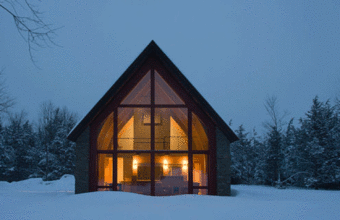
Transforming the Low Energy Housing sector
“Insulation is not sexy. Energy efficiency is not sexy. Putting more insulation in your walls that you will never see and you will never even know is there, is not sexy. But your bills are a bit lower,” said Alex Hunt, a sustainable building consultant and partner with Bright Green Homes. Is it time for …

CIED research on low energy housing highlighted in a joint workshop with Energy Saving Trust
A workshop shared findings from a CIED research project, which focuses on how intermediary organisations can facilitate low energy housing projects.

EU not yet delivering on ‘Efficiency First’ pledge, finds new study
A new paper published today finds that the EU’s ‘Winter Package’ still has some way to go to deliver on its promise of putting ‘Efficiency First’.
Too narrow and too small: CIED researcher reacts to reforms to UK government’s ECO scheme
CIED researcher reacts to the government’s announced reforms to its Energy Company Obligation scheme.

Warmer, Healthier and Fairer: Tackling Fuel Poverty
Dr Mari Martiskainen was one of the key speakers at ‘Warmer, Healthier and Fairer: Tackling Fuel Poverty’ event organised by Public Policy Exchange. Other key speakers at the event included MP Alan Whitehead, James Kerry, Senior Policy Advisor at the Department for Business, Energy and Industrial Strategy as well as Paul Massara, member of the …

Equity and justice in the energy system – the case of fuel poverty in the UK
We are again getting to the time of the year when the days are getting shorter and the nights colder. Many of us are turning our heating on, without having to think too much about it. However, many others are in a situation where they cannot afford heating in their homes and this time of …
Public Accounts Committee report published following inquiry featuring CIED researcher
The House of Commons Public Accounts Committee has published a report following their inquiry into UK energy efficiency policy that featured CIED…
CIED key note and research presented at Energy Cultures 2016 conference in New Zealand
Director of CIED, Prof Benjamin Sovacool, and two research fellows are presenting research at an Energy Cultures Conference in Wellington, New Zealand
Makerspaces: Creating inclusive spaces for sustainable innovations
Making stuff is all the rage these days. But how does sustainable development fit into this enthusiasm? The White House is celebrating a Week of Making from June 16-23 2016 after hosting its first Maker Faire in 2014 to spark a “grassroots renaissance in American making and manufacturing“. The hope is that by exposing people …
The politics of grassroots innovations set out by CIED researcher at SCORAI conference
Grassroots innovations can have unforeseen but important political dimensions that go beyond their immediate communities, argues Dr Mari Martiskainen at the second international Sustainable Consumption Research and Action Initiative (SCORAI) conference
There is no energy efficiency ‘silver bullet’ says CIED Research Fellow to Commons Public Accounts Committee
Jan Rosenow,a Senior Research Fellow at CIED, called the Green Deal a “failure” when giving evidence at the House of Commons Public Accounts Committee
Fuel poverty research presented to Secretary of State for Energy and Climate Change
2.35 million households in England living in poor quality, energy inefficient housing have to decide each winter whether to ‘eat or heat’. They live in cold homes because they can’t afford to pay their fuel bills and then suffer from respiratory illnesses which have long-term effects on their health and wellbeing, and sometimes fatal consequences. …
CIED gives evidence on energy efficiency to the House of Commons
CIED Senior Research Fellow, Dr Jan Rosenow, will be an expert witness to a House of Commons’ Public Accounts Committee inquiry into the Green Deal.
Professor Sovacool presents research on the UK’s fuel poverty strategy in Westminster
Benjamin Sovacool, Director of the Centre on Innovation and Energy Demand, presented research to the Westminster Energy, Environment and Transport Forum.
Intermediary actors in low energy transitions
Intermediary actors can be crucial for bringing about low energy transitions. This blog explores what they are and provides some key insights about intermediaries in low energy transitions. It has long been recognised that changing the way we produce and use energy is of crucial importance to tackle the challenges related to depleting fuel resources and …
Home Energy Efficiency is a “win-win” says UK Energy Committee report, which cites CIED research
Research by CIED has helped to inform the recently published UK Energy and Climate Change Committee report on Home Energy Efficiency.
The UK market for energy service contracts is growing
New CIED research suggests energy service contracts are growing rapidly in the UK public sector, delivering substantial energy and carbon savings.
Tackling Fuel Poverty – Whose responsibility is it?
By Mari Martiskainen and Sarah Schepers, Centre on Innovation and Energy Demand, November 2015 Fuel poverty – an issue affecting 2.35 million people in England alone, one that has wide-reaching causes and implications not only for those directly affected, but also for the wider society and economy. Annually, It costs the NHS approximately £1.36m as …
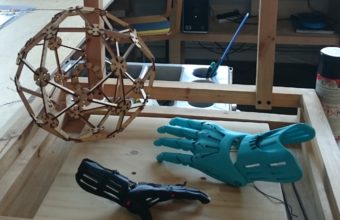
CIED and the STEPS Centre co-host workshop on makerspaces and sustainable development
In order to discuss issues and identify strategies for makerspaces in sustainable development Professor Adrian Smith organised a two-day event on “How can makerspaces, fablabs and hackerspaces help cultivate sustainable developments?”. The workshop, which was funded by CIED and co-hosted with the STEPS Centre, took place over two days in the Machines Room in London, …
As thousands die, the UK must face up to its responsibilities on fuel poverty
As we approach winter, many of us start turning the heating back on, but there are thousands of people across the UK who dread the onset of colder weather as they are forced into the fuel poverty trap. It is a phenomenon that kills, and worse, something we have become accustomed to. Another year, another …
Moving beyond products to material culture
BLOG 2 Prototyping or debating sustainable developments in makerspaces? Adrian Smith, Science Policy Research Unit, University of Sussex September 2015 In the previous blog I introduced some of the diverse ways that makerspaces are helping cultivate sustainable developments. Admittedly, these initiatives do not represent the totality of makerspaces, where many projects and activities are oblivious …
Why should we seek sustainable developments in makerspaces?
BLOG 1 Why should we seek sustainable developments in makerspaces? Adrian Smith, Science Policy Research Unit, University of Sussex Community-based workshops like hackerspaces, fablabs and makerspaces, equipped with design, prototyping and fabrication tools have spread rapidly in recent years. Interest in the social, economic and environmental possibilities of these spaces has grown too. Amidst the …
CIED contributes to conference session on energy and consumer behaviour in Brazil
I was recently invited to give a talk at the Citenel Seenel conference hosted by the Brazilian Power Regulatory Agency (ANEEL) on 17-19th August in Sauipe, Bahia. The biannual Innovation and Energy Efficiency Seminar (VIII Citenel and IV Seenel) brings together industry, academia and government to discuss results and impacts of research and experience on …
New research project to investigate how communities can tackle fuel poverty – the silent killer
New research to be conducted on the issue of fuel poverty will help researchers, policy makers and the third sector to understand how community groups can reach the vulnerable and what potential impact local activities could have. Dr Mari Martiskainen from the Centre on Innovation and Energy Demand (CIED)1, together with Dr Giovanna Speciale from South …
Energy Performance Certificates and renting in Brighton – From “nice to know” to improved houses?
Usually as a researcher I base my insights on the research and systematic empirical studies I carry out. However, on this particular occasion, the insights are of a more personal nature. Having started to do research on building energy efficiency policies about a year ago, I was interested to be faced with one specific policy …
Energy debates must not forget those less able to speak for themselves
Reflections from the 12th eceee summer study As Colin Nolden mentioned in his post yesterday,four members of the Centre on Innovation and Energy Demand attended the eceee Summer Study held near Hyeres, south of France, during 1-6th June 2015. The bi-annual eceee’s Summer Study has been held since 1993 and it focuses on energy efficiency …
Innovation supporting intermediaries needed in advancing low energy building and housing
The emergence of new innovations and their diffusion is extremely important in the field of low energy building and housing. As buildings throughout their lifecycle account for around 40% of total energy use in Europe (with over half by residential buildings), reducing the energy demand of the existing building stock and increasing non-carbon micro-generation in …
Why We Need to Shift Focus from Energy Supply to Reducing Demand
Mari Martiskainen asks whether it is time to have a real debate about moving our focus from energy supply to realising the benefits of energy efficiency. The International Energy Agency (IEA) reported last week that the energy efficiency market was worth between $310 billion and $360 billion in 2011; thanks to energy efficiency improvements in …
Tackling the existing building stock as a real energy policy priority
By Mari Martiskainen and Florian Kern, Centre on Innovation and Energy Demand, SPRU Those familiar with the UK’s energy efficiency policy for buildings are aware that back in 2006 the then Labour government announced that all new domestic buildings would need to be ‘zero carbon’ from 2016 to help meet the government’s energy and climate …
Makers, fixers and circular economies
The connection between grassroots making and fixing movements and innovation for low energy demand may not be immediately obvious. When thinking about energy demand and resource use it is reasonable to focus attention on immediate and intensive activities, such as heating homes or offices, or making energy-using products more efficient. However, if we think about …
Building and nurturing a community: the importance of material and emotional dimensions in grassroots innovation
As part of our CIED activities and with support from Ellen van Oost (University of Twente), Johan Soderberg (IFRIS) and Sascha Dickel (Technical University Munich), we recently ran a session for practitioners and academics involved and interested in grassroots digital fabrication. It was held as part of a wider conference considering an Innovative Civil Society …